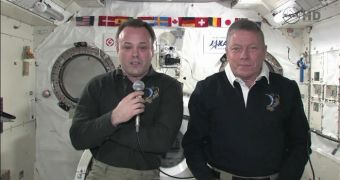A couple of weeks ago, a Russian Soyuz rocket carrying an unmanned Progress resupply capsule failed after launch. The event prompted the Russian Federal Space Agency to ground all Soyuz rocket flights, including those scheduled to serve the International Space Station. Three astronauts are now stranded.
NASA astronaut Ron Garan is among the ISS crew that will be forced to remain aboard the orbital lab for longer periods of time. This means that his stay will exceed the usual 5-and-a-half month duration for a rotation aboard the facility.
RosCosmos does not plan to restart Soyuz flights until it compiles a full analysis of the Progress 44 failure that occurred on August 24. The delivery system is the same as the one that carries the main Soyuz manned space capsule which delivers astronauts to low-Earth orbit (LEO).
The situation is made even more intense by the fact that the Russia Federation is now the only one capable of conducting manned spaceflight. With the retirement of the NASA space shuttles in late July, only the Russian space agency can ensure ISS crew rotation.
Garan and astronaut Mike Fossum conducted an interview with reporters yesterday, September 6, saying that they hope to see RosCosmos handle all aspects of the Soyuz problem as soon as possible. However, the issue is very complex, since everyone is relieved that the failed rocket only carried cargo.
“The investigation is still ongoing for what happened with the Soyuz booster. The whole path from here to launching humans – there's a number of steps along the way: finding the problem, fixing the problem, having a few unmanned test flights,” Fossum said.
“There's a lot of things that have to stack up to make that happen,” the NASA astronaut added, quoted by Space.
In the mean time, NASA and RosCosmos need to decide how to handle the situation. Half of the Expedition 28 crew – which was supposed to return home this month – can use one of the two Soyuz capsules docked on the ISS to get home.
But that would leave the station manned by only a 3-member crew for an unknown period of time, which does not bode well either for the other 3 astronauts or the station itself. The sheer volume of work that needs to be done could get overwhelming.
For the time being, the two space agencies decided to keep the three astronauts – Garan, Aleksandr Samokutyayev and Andrei Borisenko – on board the space lab for now. They will be issued new orders when RosCosmos manages to figure out what went wrong with the Soyuz rocket.
“It's possible we will have a station without people on it for a hopefully short period of time. We'll be getting into the details of what it takes to turn out the lights in the weeks ahead. It's too early for us to get too worried about that right now, frankly,” Fossum said during the interview.
“From a supply point of view we really are in good shape. We've got a lot of water on board, a lot of food onboard, a lot of consumables on board. We haven't gotten to the point yet where we really need to start conserving,” Garan concluded.

 14 DAY TRIAL //
14 DAY TRIAL //